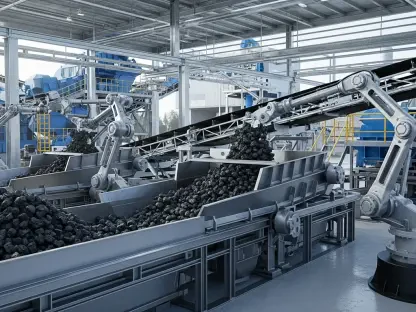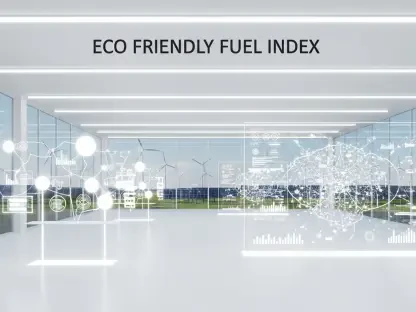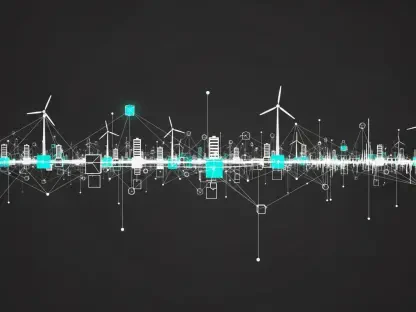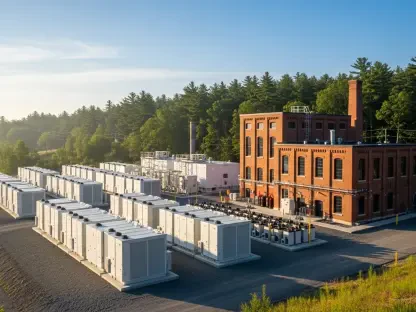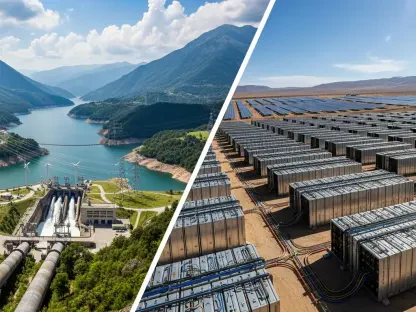Corporate giants like Cisco have taken a groundbreaking step in the renewable energy sector by securing energy from Texas solar projects through virtual power purchase agreements (VPPAs). This aggregation of six VPPAs aims to harness energy from two forthcoming solar plants—Star Dairy and Rosebud—that are being developed by global renewable energy leader X-ELIO. These projects are poised to be operational by July 2027, promising a sustainable energy supply that aligns with the environmental goals of corporate buyers.
Strategic Procurement Initiative
Aggregated VPPAs for Enhanced Efficiency
On March 12, Sustainability Roundtable announced an ambitious aggregated procurement from VPPAs through its Net Zero Consortium for Buyers (NZCB). This strategic initiative aims to secure 172 MW of purchaser-caused energy attribute certificates (PC EACs) from the Star Dairy and Rosebud solar plants. The NZCB’s revolutionary VPPA 2.0 model optimizes buyer risk management through transparent but seller-blind reverse auctions, making the process highly beneficial for high-credit buyers.
The aggregation of six VPPAs under this initiative is a testament to the innovative approach being taken to streamline the procurement process while reducing risk for corporate buyers. The reverse auction mechanism allows for a highly competitive environment where bids are transparent to buyers but kept blind from sellers, ensuring fair pricing and optimizing transaction structures. This makes the process more accessible and efficient for high-credit companies looking to invest in renewable energy sources, further highlighting the collaborative effort required to meet ambitious sustainability goals.
Corporate Collaboration for Renewable Goals
This groundbreaking project involves major corporations including Cisco, Biogen, IDEXX Laboratories, and Waters Corp. Their combined efforts have already exceeded the NZCB’s initial target of facilitating over a gigawatt of new renewable energy by 2025, marking a significant milestone in the journey toward a more sustainable future. The NZCB’s broader goal is to instigate 10 GW of new renewable energy capacity by 2030, reflecting its strong commitment to sustainable practices and corporate responsibility.
These collaborations not only divert significant investments towards renewable energy infrastructure but also set a precedent for other corporations to follow. By pooling their resources and sharing procurement risks, these companies are demonstrating that large-scale renewable energy projects are not just feasible but also economically advantageous. This collaborative approach ensures that the environmental and economic benefits of these projects are maximized, paving the way for future initiatives that can further accelerate the transition to renewable energy.
Individual Corporate Contributions
Cisco’s Leadership in Sustainability
Cisco has taken a leading role in this initiative with a VPPA for 50 MW from both the Star Dairy and Rosebud projects. This move is part of Cisco’s broader strategy to achieve net zero emissions across its entire value chain by 2040, showcasing the company’s strong commitment to sustainable energy practices. By securing a substantial amount of renewable energy, Cisco is not only reducing its carbon footprint but also setting an example for other corporations to follow.
This initiative highlights Cisco’s dedication to integrating sustainable practices into its core business operations. The company’s long-term vision for a net-zero value chain by 2040 demonstrates its commitment to environmental stewardship and corporate responsibility. By investing in renewable energy projects, Cisco is taking proactive steps to mitigate climate change and promote a more sustainable future, reinforcing its role as a leader in corporate sustainability.
Biogen, IDEXX, and Waters Corp. Initiatives
Biogen has committed to PC EACs from 12 MW of Star Dairy and 23 MW of Rosebud, continuing its long-standing commitment to 100% renewable energy, which it has maintained since 2014. This commitment reflects Biogen’s dedication to reducing its environmental impact and promoting sustainable practices within its operations. By securing renewable energy from these projects, Biogen is reinforcing its position as a leader in corporate sustainability.
Similarly, IDEXX Laboratories will secure PC EACs from 20 MW of Star Dairy, reinforcing its aim of obtaining 100% renewable electricity by 2030. This move aligns with IDEXX’s broader sustainability goals and demonstrates its commitment to reducing its carbon footprint. Waters Corp. will also procure PC EACs from 17 MW of Star Dairy, further aligning its operations with sustainable energy practices. These commitments from Biogen, IDEXX, and Waters Corp. highlight the importance of corporate responsibility and the role that large organizations play in promoting sustainability and mitigating climate change.
VPPA 2.0 Model: A Collaborative Approach
Democratizing Utility-Scale Clean Energy
The VPPA 2.0 model developed by NZCB is pivotal in this procurement initiative, democratizing access to utility-scale clean energy. This model emphasizes the standardization and streamlining of the procurement process, allowing not just the largest energy consumers but also smaller enterprises to participate in renewable energy purchases. By making the process more accessible, the VPPA 2.0 model enables a wider range of companies to invest in renewable energy and contribute to the broader sustainability goals.
This democratization of clean energy access is critical for achieving large-scale renewable energy adoption. By lowering the barriers to entry for smaller companies, the VPPA 2.0 model ensures that the benefits of renewable energy are not limited to the largest corporations. This inclusive approach fosters a more collaborative environment where companies of all sizes can work together to achieve their sustainability goals. This not only drives significant investments in renewable energy infrastructure but also promotes a more resilient and sustainable energy future.
Transparent and Competitive Bidding Process
The reverse auction methodology used in VPPA 2.0 fosters transparency for buyers while keeping sellers blind to bids, resulting in optimized transaction structures and minimized buyer risk. This approach encourages high-credit companies to pool their resources and drive significant renewable energy projects. The transparent bidding process ensures fair pricing and enhances the overall effectiveness of the procurement strategy.
By adopting this innovative approach, the VPPA 2.0 model provides a robust framework for corporate renewable energy procurement. The competitive bidding process not only ensures cost-effectiveness but also promotes a more transparent and equitable marketplace. This collaborative economic approach allows high-credit buyers to leverage their resources effectively, driving the development of new renewable energy projects at scale. The success of this model underscores its potential for replication across North America and Europe, further advancing the transition to a sustainable energy future.
Scalability and Future Prospects
High-Credit Buyers Leading the Charge
The enthusiastic participation of high-credit buyers like NZCB members in the VPPA 2.0 model underscores an important trend in the corporate renewable energy landscape. By pooling their resources, these companies can spread procurement risk and diversify their renewable energy portfolios, enhancing both cost-effectiveness and overall sustainability. This collaborative approach not only benefits the participating companies but also drives significant advancements in renewable energy infrastructure.
The collective efforts of these high-credit buyers highlight the potential for large-scale renewable energy projects to be both economically and environmentally beneficial. By working together, these companies are setting a new standard for corporate renewable energy procurement, demonstrating that it is possible to achieve ambitious sustainability goals through collaboration. This trend is likely to continue, with more high-credit companies joining forces to drive the transition to a sustainable energy future.
Long-term Environmental Benefits
Major corporations like Cisco have made a significant move in the renewable energy arena by acquiring power from Texas solar projects through virtual power purchase agreements (VPPAs). This involves six VPPAs consolidating their efforts to source energy from two upcoming solar plants—Star Dairy and Rosebud—currently under development by X-ELIO, a world-leading renewable energy firm. These solar projects are scheduled to become operational by July 2027. By securing energy through VPPAs, these corporations ensure a steady and sustainable power supply that aligns with their environmental objectives. This strategic commitment to green energy underscores the growing emphasis on sustainability within corporate operations, showcasing a proactive approach to addressing climate change and promoting renewable energy solutions. These initiatives not only contribute to reducing carbon footprints but also set a precedent for other companies to follow suit in the pursuit of ecological responsibility.


